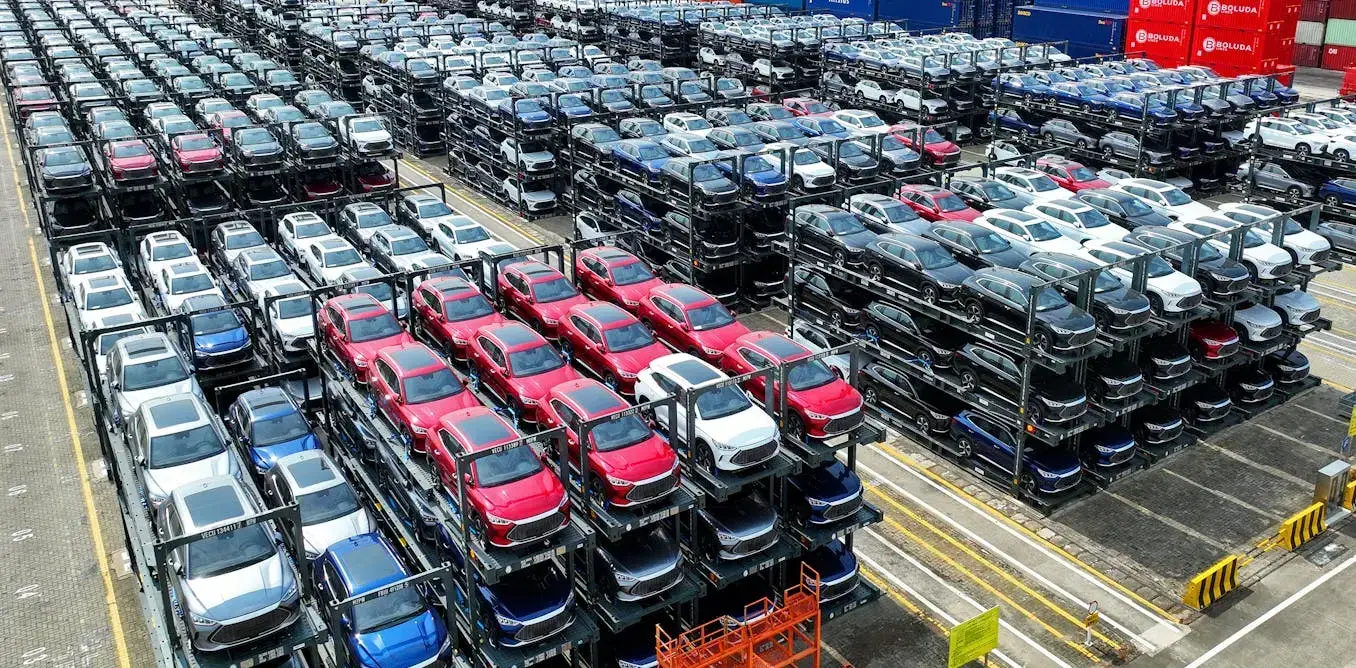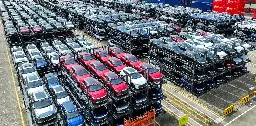History says tariffs rarely work, but U.S. President Biden’s 100% tariffs on Chinese EVs could defy the trend, researcher says
History says tariffs rarely work, but U.S. President Biden’s 100% tariffs on Chinese EVs could defy the trend, researcher says

History says tariffs rarely work, but Biden’s 100% tariffs on Chinese EVs could defy the trend

By Tinglong Dai, Bernard T. Ferrari Professor of Business, Johns Hopkins University
In June 2019, then-presidential candidate Joe Biden tweeted: “Trump doesn’t get the basics. He thinks his tariffs are being paid by China. Any freshman econ student could tell you that the American people are paying his tariffs.”
Fast-forward five years to May 2024, and President Biden has announced a hike in tariffs on a variety of Chinese imports, including a 100% tariff that would significantly increase the price of Chinese-made electric vehicles.
For a nation committed to reducing greenhouse gas emissions, efforts by the U.S. to block low-cost EVs might seem counterproductive. At a price of around US$12,000, Chinese automaker BYD’s Seagull electric car could quickly expand EV sales if it landed at that price in the U.S., where the cheapest new electric cars cost nearly three times more.
As an expert in global supply chains, however, I believe the Biden tariffs can succeed in giving the U.S. EV industry room to grow. Without the tariffs, U.S. auto sales risk being undercut by Chinese companies, which have much lower production costs due to their manufacturing methods, looser environmental and safety standards, cheaper labor and more generous government EV subsidies.
Tariffs have a troubled history
The U.S. has a long history of tariffs that have failed to achieve their economic goals.
The Smoot-Hawley Tariff Act of 1930 was meant to protect American jobs by raising tariffs on imported goods. But it backfired by prompting other countries to raise their tariffs, which led to a drop in international trade and deepened the Great Depression.
Biden speaks at a podium with people standing behind him holding United Steelworkers signs.
President George W. Bush’s 2002 steel tariffs also led to higher steel prices, which hurt industries that use steel and cost American manufacturing an estimated 200,000 jobs. The tariffs were lifted after the World Trade Organization ruled against them.
The Obama administration’s tariffs on Chinese-made solar panels in 2012 blocked direct imports but failed to foster a domestic solar panel industry. Today, the U.S. relies heavily on imports from companies operating in Southeast Asia – primarily Cambodia, Malaysia, Thailand and Vietnam. Many of those companies are linked to China.
Why EV tariffs are different this time
Biden’s EV tariffs, however, might defy historical precedent and succeed where the solar tariff failed, for a few key reasons:
1. Timing matters.
When Obama imposed tariffs on solar panels in 2012, nearly half of U.S. installations were already using Chinese-manufactured panels. In contrast, Chinese-made EVs, including models sold in the U.S. by Volvo and Polestar, have negligible U.S. market shares.
Because the U.S. market is not dependent on Chinese-made EVs, the tariffs can be implemented without significant disruption or price increases, giving the domestic industry time to grow and compete more effectively.
By imposing tariffs early, the Biden administration hopes to prevent the U.S. market from becoming saturated with low-price Chinese EVs, which could undercut domestic manufacturers and stifle innovation.
2. Global supply chains are not the same today.
The COVID-19 pandemic exposed vulnerabilities in global supply chains, such as the risk of disruptions in the availability of critical components and delays in production and shipping. These issues prompted many countries, including the U.S., to reevaluate their dependence on foreign manufacturers for critical goods and to shift toward reshoring – bringing manufacturing back to the U.S. – and strengthening domestic supply chains.
The war in Ukraine has further intensified the separation between U.S.-led and China-led economic orders, a phenomenon I call the “Supply Chain Iron Curtain.”
In a recent McKinsey survey, 67% of executives cited geopolitical risk as the greatest threat to global growth. In this context, EVs and their components, particularly batteries, are key products identified in Biden’s supply chain reviews as critical to the nation’s supply chain resilience.
Ensuring a stable and secure supply of these components through domestic manufacturing can mitigate the risks associated with global supply chain disruptions and geopolitical tensions.
3. National security concerns are higher.
Unlike solar panels, EVs have direct national security implications. The Biden administration considers Chinese-made EVs a potential cybersecurity threat due to the possibility of embedded software that could be used for surveillance or cyberattacks.
U.S. Commerce Secretary Gina Raimondo has discussed espionage risks involving the potential for foreign-made EVs to collect sensitive data and transmit it outside the U.S. Officials have raised concerns about the resilience of an EV supply chain dependent on other countries in the event of a geopolitical conflict.
BYD targets EV sales in Mexico
While Biden’s EV tariffs might succeed in keeping Chinese competition out for a while, Chinese EV manufacturers could try to circumvent the tariffs by moving production to countries such as Mexico.
This scenario is similar to past tactics used by Chinese solar panel manufacturers, which relocated production to other Asian countries to avoid U.S. tariffs.
Chinese automaker BYD, the world leader in EV sales, is already exploring establishing a factory in Mexico to produce its new electric truck. Nearly 10% of cars sold in Mexico in 2023 were produced by Chinese automakers.
Given the changing geopolitical reality, Biden’s 100% EV tariffs are likely the beginning of a broader strategy rather than an isolated measure. U.S. Trade Representative Katherine Tai hinted at this during a recent press conference, stating that addressing vehicles made in Mexico would require “a separate pathway” and to “stay tuned” for future actions.
Is Europe next?
For now, given the near absence of Chinese-made EVs in the U.S. auto market, Biden’s EV tariffs are unlikely to have a noticeable short-term impact in the U.S. They could, however, affect decisions in Europe.
The European Union saw Chinese EV imports more than double over a seven-month period in 2023, undercutting European vehicles by offering lower prices. Manufacturers are concerned. When finance ministers from the Group of Seven advanced democracies meet in late May, tariffs will be on the agenda.
Biden’s move might encourage similar protective actions elsewhere, reinforcing the global shift toward securing supply chains and promoting domestic manufacturing.
